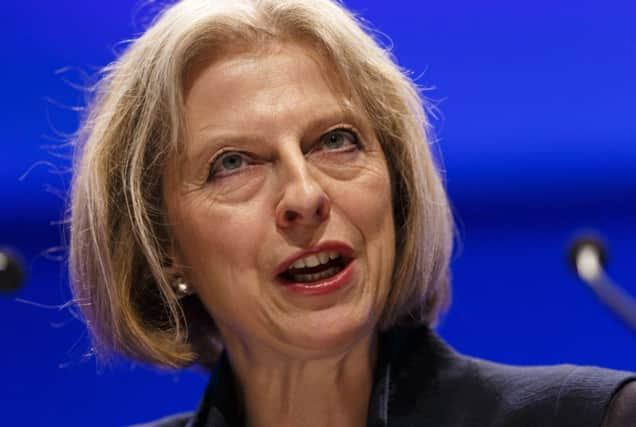UK anti-terror law is ‘dangerous grab-bag’


A new Counter-terrorism and Security Bill, containing a range of draconian powers including new orders that can block suspected British fighters from returning to the UK, was introduced to parliament.
The anti-extremist reforms were published as police officers entered the third day of a counter-terrorism awareness week, which will see more than 6,000 people receive briefings at 80 venues across Britain.
Advertisement
Hide AdAdvertisement
Hide AdPlans to block suspected jihadists returning to Britain in the bill are “nothing like as dramatic” as David Cameron indicated they would be earlier this year, according to the Independent Reviewer of Terrorism Legislation, David Anderson.
Mr Anderson described the original proposals unveiled by the Prime Minister in September to counter the threat from UK-based extremists travelling abroad to fight for Islamic State (IS) as an “announcement waiting for a policy”.
He told MPs and peers he believed it had soon become clear that such a move would “neither legally nor practically” work and the plan was now for a system of “managed return”.
The new counter-terror legislation will ban insurance companies from footing the bill for terrorist ransoms and powers will be re-introduced to relocate terror suspects across the UK. A statutory duty will be placed on named organisations – such as colleges, universities, the police and probation providers – to help deter radicalisation and, where organisations fail, ministers will be able to issue court-enforced directions to them.
CONNECT WITH THE SCOTSMAN
• Subscribe to our daily newsletter (requires registration) and get the latest news, sport and business headlines delivered to your inbox every morning
Police are to be handed powers to force internet firms to hand over details that could help identify suspected terrorists and paedophiles, while police and border staff will be given the power to seize their passports.
The bill’s second reading in parliament – the first opportunity for MPs to debate its principles – will take place today.
However, Amnesty International UK legal adviser Rachel Logan said: “It’s dangerous to rush through this grab-bag of measures without proper scrutiny or challenge. While the government needs to ensure anyone suspected of criminal activity is investigated, measures like invalidating passports and excluding British nationals from their home country push the boundaries of international law.”
Advertisement
Hide AdAdvertisement
Hide AdShe said adding the “internal exile of forced relocation” to current measures raised “significant concern for basic freedoms”. She continued: “We simply don’t have the fair and proper processes in place for such drastic decisions.”
Islamic Human Rights Commission chair Massoud Shadjareh said: “To go down the same route of policies which have failed to address terrorism is just going to alienate Muslims further and increase ‘otherisation’ of communities, encouraging the kind of victimisation that has resulted in attacks on places of worship and individuals.”
But Home Secretary Theresa May said: “This bill includes a considered, targeted set of proposals that will help keep us safe at a time of very significant danger by ensuring we have the powers we need to defend ourselves.”
Yesterday, the counter-terror campaign shifted focus to preventing vulnerable people from being brainwashed through social media.
Earlier this week the intelligence and security committee in its report on the murder of soldier Lee Rigby said the government’s Prevent programme, designed to divert individuals from radicalisation, has not been given sufficient priority.
People found at risk of radicalisation are then offered support through the “Channel” process, which involves agencies working to give individuals access to services such as health, education, specialist mentoring and diversionary activities.
Between 2007 and 2014, there were 3,934 referrals to Channel.
National policing lead for the Prevent programme, Chief Constable Sir Peter Fahy, said: “The police cannot be in every mosque, college or other community venue monitoring what is discussed and the doctrines promoted. Nor would we want Britain to be such a society.
Advertisement
Hide AdAdvertisement
Hide Ad“We need parents, schools, partners, friends and colleagues to be aware of the signs someone is being influenced by extremist messages and have the confidence to report any concerns to the police. Look out for notable changes in behaviour and mood, those vulnerable may begin to express extreme views, or appear increasingly sympathetic to terrorist acts, their appearance may change along with the friends they spend time with or they may start to spend excessive time on their own or on the internet.”
Shadow home secretary Yvette Cooper said: “We have seen unprecedented numbers of people travelling from our country to join Isil [Islamic State of Iraq and the Levant] in Syria and Iraq, so more does need to be done to make sure there are rapid ways to remove someone’s passport if they are about to travel to join the fighting, and also to deal with the threat from those who want to return.
“We will look at the detail of these proposals to make sure they are effective and proportionate, with appropriate safeguards in place.
“However, it is important to ensure any new measures are workable and are drawn up to deal with the terror threat rather than to deal with the Prime Minister’s headlines. We need strong powers to tackle the threat from Isil and we also need strong checks and balances too.”
SCOTSMAN TABLET AND IPHONE APPS